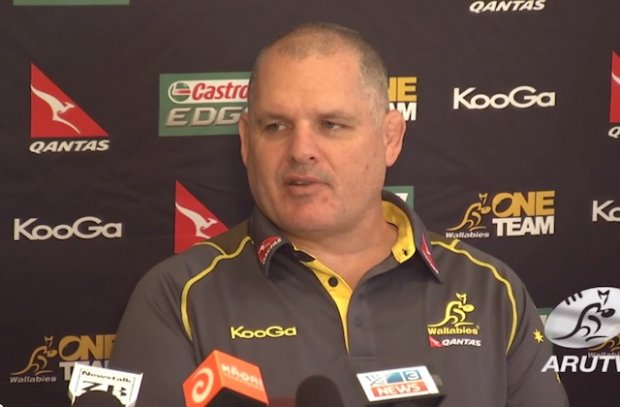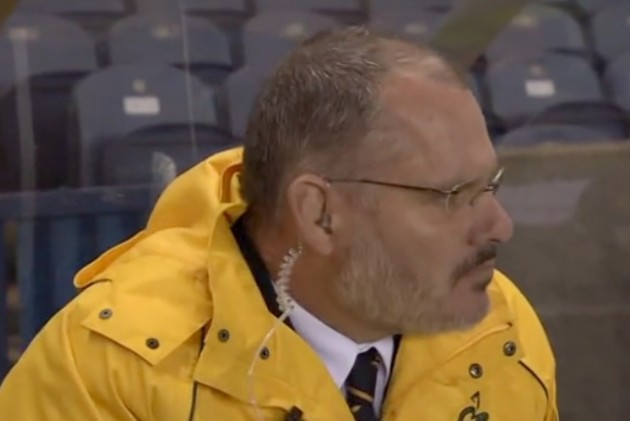Wallabies coach Ewen McKenzie, Fox Sports commentator Rod Kafer, former test referee Wayne Erickson and former Wallabies coach Bob Dwyer will make up the NRC experimental law panel which will look at opportunities for innovation and what constitutes the best game for the upcoming National Rugby Championship.
Experimental laws were used previously in the Australian Rugby Championship back in 2007 and several of the laws that were trialled have been adopted in the game today. South Africa’s Varsity Cup has also had success using experimental laws.
Matt Rowley and myself sat down with McKenzie, Kafer and Ben Whitaker yesterday after their first meeting as a panel to discuss it’s objectives. You can hear the full interview below
Q: What is the role of this experimental law panel?
Ewen: Well obviously we’ve got a new competition so that brings a lot of opportunity in many areas and obviously it’s a great opportunity to have a look at the laws of the game and go to the fan base and see what they think too. Rugby’s one of those things which has so many moving parts to it and there’s so many bits that people think are pivotal and here’s an opportunity within reason [to address them].
Q: What would make this panel successful?
Ewen: Going back to 1996, Super Rugby led the way in the world in terms of trying new things … but the fabric of the game and the fundamentals of the game still need to be there. A game for all shapes and sizes, a game which involves contest … it’s about trying to get a better game outcome. Some of the things we’ve talked about include ball in play time and an emphasis on some of the laws which may have been forgotten … then obviously some areas where we can try and innovate and do differently.
I guess the challenge is how many things do you change? That’s one things we’ve learnt in Super Rugby – if you change too many things you might go too far so it’s about being balanced and that’s why there’s a meeting of the minds but in terms of being creative the fan base is a good place to start.
Q: What’s the balance between the excitement of the game and getting the right skills coming through?
Rod: I think there’s a few components to the game of rugby to make it successful. It has to be a game that people can understand when people watch it. So it needs to be simple enough that people can understand what they’re looking at.
It has to be engaging enough so that people want to play it and enjoy playing it. It has to be adjudicated so that people understand what’s going to happen if they do something right or do something wrong and for me it should also encourage risk taking. We want to see excitement, we want to see things that make the game of rugby special and make it different.
It needs to promote risk taking and if you can get those balances right it will be something people want to watch on TV, be at the game, referee and want to participate in and they’re the things that make rugby great. It needs to have all the components which we understand about rugby now but put into a product which everybody enjoys.
Q: How’s the process going to work? Have you guys got an outline of the steps to get there?
Ewen: We spent today working on … the key elements and in the end we need to provide a framework and ask the fan base for their opinion … we’ve got our own creative juices which we’re holding back. Guys like Bob Dwyer have got lots of ideas about what work and we touched on some of those things today and we’ll see what the rugby community thinks and we have our own thoughts.
I would be surprised if there wasn’t a fair bit of cross over … but it’s just a matter of us working out how far do you go and in the end the game still has to look like a game and people have to understand. Kafe made a good point about the simplicity, for people to follow rugby it’s got to make sense. But I do like some of these things, we’ve been in this space before and South Africa do it with the Varsity Cup competition … It’s a really good opportunity for Australia to take the lead again … trying to refine it and look back and make sure there are things that are there that do work and also tweak a few things which allow a bit more innovation and creativity.
Q: How are you guys going to use the feedback about law changes? Is it going to be a popularity contest or is it about picking up some ideas that you guys then decide between? Have you guys got some ideas in how that might work?
Ewen: You being involved in Green and Gold Rugby and obviously the other commentary sites where people express their opinions is the perfect opportunity to express them. Obviously they need to be considered and make sense but I think… we need to get on with it because the competition is not that far away.
Ben: We’re keen to make sure that it is open to the public to suggest whatever they believe can make for a better game. This panel will do two things – we’ll set a framework to assess those submissions because I think that’s critical because we know that we’re going to have to request the ability to play these law variations to the IRB … We want as much creative thinking on this as we can get and we’ll prioritise a list that will ultimately be voted on by the public as well. So two levels of engagement for the public.
Q: We opened it up to the our forum yesterday to ask for ideas and at least half of the feedback said to not change them [the laws]. If anything our weaknesses as a country tends to focus around areas where if you are going to make it a more simple game, you would only exacerbate those problems. Is it possible you guys can come out of the process and say “don’t touch the laws”?
Ewen: Some of the discussion today was around that very topic and focusing around the laws that already exist. That’s not changing anything, it’s just making sure we focus of the elements that are already there and perhaps haven’t been prioritised. It’s entirely possible that that could happen…
Kafe: There’s a reason why rugby has been so successful over a long period of time, in the last 100 years it hasn’t changed a great deal … If you watched rugby back 100 years ago and you watch the product today, you’d probably say you’re watching the same thing which I think is a really positive thing about the game. Sure there are differences in it but the fabric of the game absolutely needs to remain in tact.
I think Bob Dwyer was really particular in his views around the enforcement of the existing laws of the game and I think there’s a heck of a lot to be said for that. Though rugby’s got more than an obligation than to appeal to it’s hardcore fans because hardcore fans are one thing but broadening the game – if that’s the desire of rugby in Australia then we have to find a mechanism to draw people into the game who weren’t necessarily brought up on the game of rugby.
That’s the challenge I think and that’s what the competition provides itself. Part of that is to make the game more obvious, more simple and easier to understand without moving away from the laws of the game too much. I sit down with people every weekend – some of them in our commentary team, who still don’t know the laws of the game. People who can’t give you an answer as to why a penalty was given and their people who’ve played many many test matches for Australia. That’s a problem in the game of rugby.



